Service Marketing: A Case Study of Hilton Sydney Hotel Operations
VerifiedAdded on 2023/06/05
|8
|2946
|489
Report
AI Summary
This report provides a comprehensive analysis of the service marketing operations at Hilton Sydney Hotel, focusing on both front stage (customer-facing) and backstage (support) activities. It includes flowcharts illustrating these operations, highlighting the significance of service encounters in shaping customer satisfaction and loyalty. The report also delves into the managerial implications of these service operations, emphasizing the importance of customer interaction and service quality in maintaining a strong brand image and achieving sustainable service excellence. The analysis underscores the need for seamless integration between front and back-end processes to meet customer expectations and deliver exceptional service experiences. Desklib offers a wealth of similar solved assignments and past papers for students.

Running head: SERVICE MARKETING
Service Marketing
Student’s name:
Name of the university:
Author’s note:
Service Marketing
Student’s name:
Name of the university:
Author’s note:
Paraphrase This Document
Need a fresh take? Get an instant paraphrase of this document with our AI Paraphraser

1SERVICE MARKETING
Executive Summary
The purpose of the paper is to highlight the service operations of the Hilton Sydney Hotel.
Service designs are mainly two types; front stage and backstage activities. In front stage
operation, the customers can interact with the service firm and in backstage operations; the
staffs may not interact with the customers. In this paper, both front stage and backstage
operations of Hilton Hotel Sydney are depicted with flowcharts. Hilton Hotel Sydney is a
five-star hotel with the perfect planning of the front stage and backstage operations. In front
stage operations, the staffs have to face the service encounters and these service encounters
are very important due to the long-term branding of the service firm and customer
satisfaction. The managerial implication is associated with the customer interaction and
management cannot underestimate the importance of customer interaction.
Executive Summary
The purpose of the paper is to highlight the service operations of the Hilton Sydney Hotel.
Service designs are mainly two types; front stage and backstage activities. In front stage
operation, the customers can interact with the service firm and in backstage operations; the
staffs may not interact with the customers. In this paper, both front stage and backstage
operations of Hilton Hotel Sydney are depicted with flowcharts. Hilton Hotel Sydney is a
five-star hotel with the perfect planning of the front stage and backstage operations. In front
stage operations, the staffs have to face the service encounters and these service encounters
are very important due to the long-term branding of the service firm and customer
satisfaction. The managerial implication is associated with the customer interaction and
management cannot underestimate the importance of customer interaction.
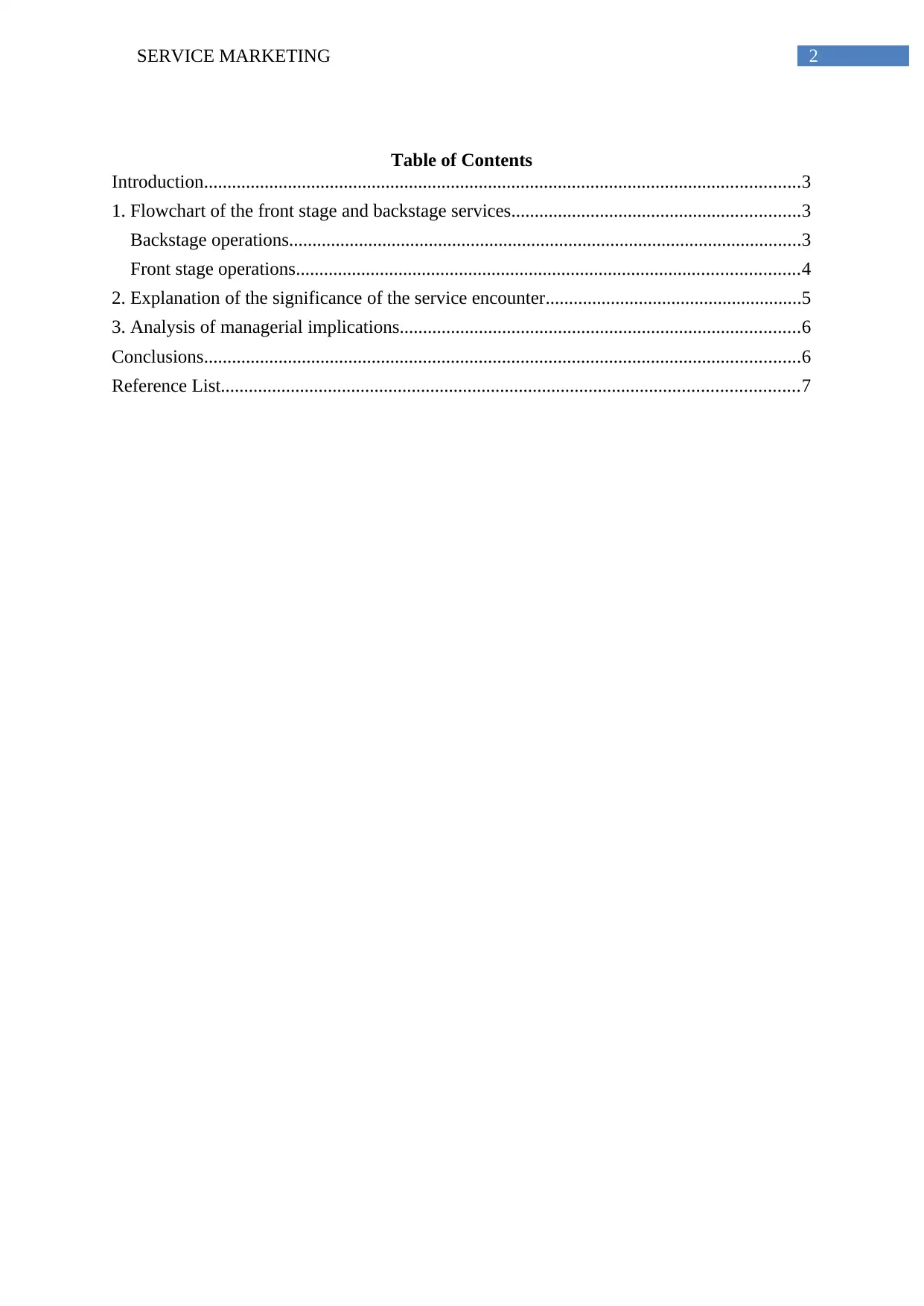
2SERVICE MARKETING
Table of Contents
Introduction................................................................................................................................3
1. Flowchart of the front stage and backstage services..............................................................3
Backstage operations..............................................................................................................3
Front stage operations............................................................................................................4
2. Explanation of the significance of the service encounter.......................................................5
3. Analysis of managerial implications......................................................................................6
Conclusions................................................................................................................................6
Reference List............................................................................................................................7
Table of Contents
Introduction................................................................................................................................3
1. Flowchart of the front stage and backstage services..............................................................3
Backstage operations..............................................................................................................3
Front stage operations............................................................................................................4
2. Explanation of the significance of the service encounter.......................................................5
3. Analysis of managerial implications......................................................................................6
Conclusions................................................................................................................................6
Reference List............................................................................................................................7
⊘ This is a preview!⊘
Do you want full access?
Subscribe today to unlock all pages.

Trusted by 1+ million students worldwide
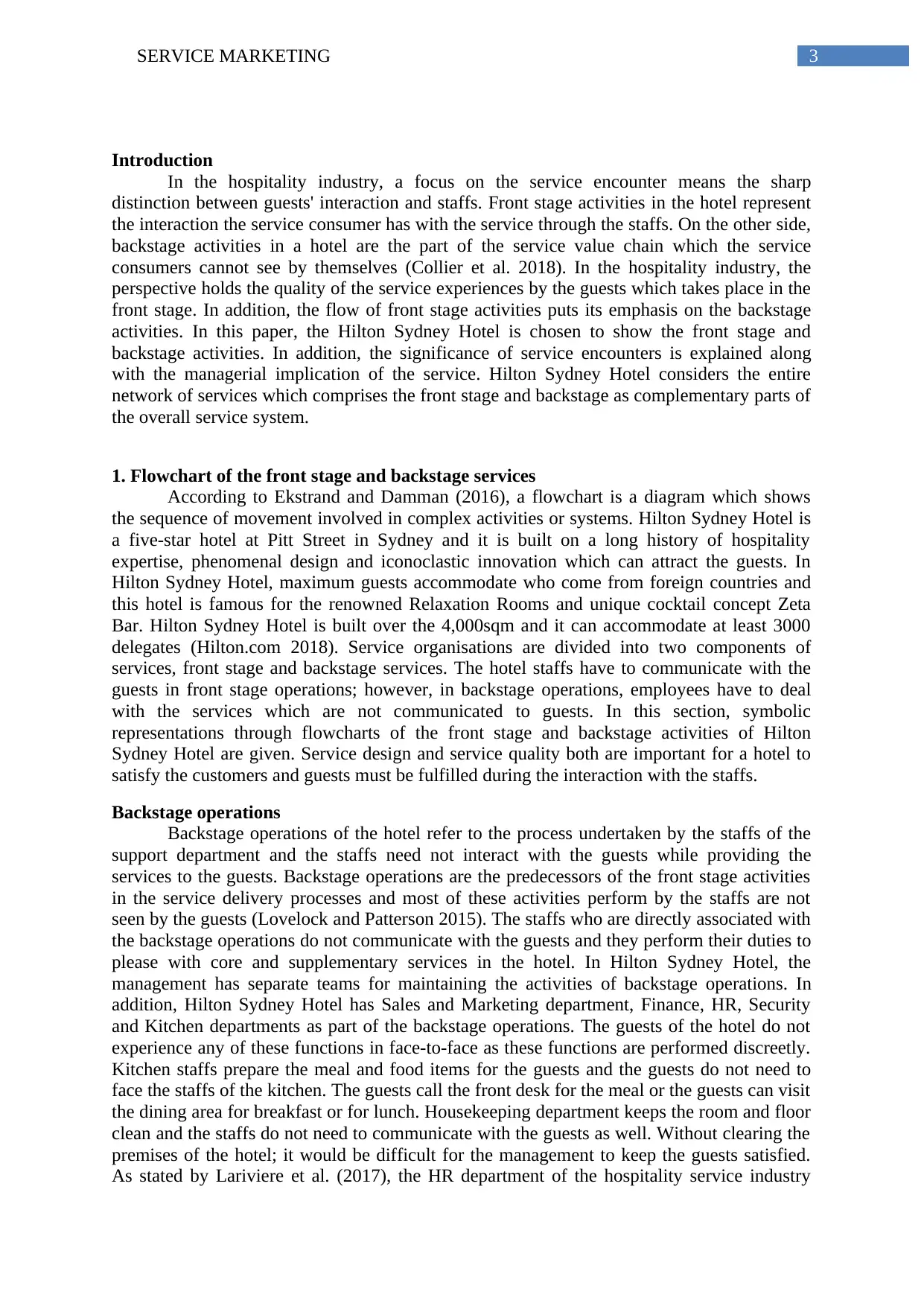
3SERVICE MARKETING
Introduction
In the hospitality industry, a focus on the service encounter means the sharp
distinction between guests' interaction and staffs. Front stage activities in the hotel represent
the interaction the service consumer has with the service through the staffs. On the other side,
backstage activities in a hotel are the part of the service value chain which the service
consumers cannot see by themselves (Collier et al. 2018). In the hospitality industry, the
perspective holds the quality of the service experiences by the guests which takes place in the
front stage. In addition, the flow of front stage activities puts its emphasis on the backstage
activities. In this paper, the Hilton Sydney Hotel is chosen to show the front stage and
backstage activities. In addition, the significance of service encounters is explained along
with the managerial implication of the service. Hilton Sydney Hotel considers the entire
network of services which comprises the front stage and backstage as complementary parts of
the overall service system.
1. Flowchart of the front stage and backstage services
According to Ekstrand and Damman (2016), a flowchart is a diagram which shows
the sequence of movement involved in complex activities or systems. Hilton Sydney Hotel is
a five-star hotel at Pitt Street in Sydney and it is built on a long history of hospitality
expertise, phenomenal design and iconoclastic innovation which can attract the guests. In
Hilton Sydney Hotel, maximum guests accommodate who come from foreign countries and
this hotel is famous for the renowned Relaxation Rooms and unique cocktail concept Zeta
Bar. Hilton Sydney Hotel is built over the 4,000sqm and it can accommodate at least 3000
delegates (Hilton.com 2018). Service organisations are divided into two components of
services, front stage and backstage services. The hotel staffs have to communicate with the
guests in front stage operations; however, in backstage operations, employees have to deal
with the services which are not communicated to guests. In this section, symbolic
representations through flowcharts of the front stage and backstage activities of Hilton
Sydney Hotel are given. Service design and service quality both are important for a hotel to
satisfy the customers and guests must be fulfilled during the interaction with the staffs.
Backstage operations
Backstage operations of the hotel refer to the process undertaken by the staffs of the
support department and the staffs need not interact with the guests while providing the
services to the guests. Backstage operations are the predecessors of the front stage activities
in the service delivery processes and most of these activities perform by the staffs are not
seen by the guests (Lovelock and Patterson 2015). The staffs who are directly associated with
the backstage operations do not communicate with the guests and they perform their duties to
please with core and supplementary services in the hotel. In Hilton Sydney Hotel, the
management has separate teams for maintaining the activities of backstage operations. In
addition, Hilton Sydney Hotel has Sales and Marketing department, Finance, HR, Security
and Kitchen departments as part of the backstage operations. The guests of the hotel do not
experience any of these functions in face-to-face as these functions are performed discreetly.
Kitchen staffs prepare the meal and food items for the guests and the guests do not need to
face the staffs of the kitchen. The guests call the front desk for the meal or the guests can visit
the dining area for breakfast or for lunch. Housekeeping department keeps the room and floor
clean and the staffs do not need to communicate with the guests as well. Without clearing the
premises of the hotel; it would be difficult for the management to keep the guests satisfied.
As stated by Lariviere et al. (2017), the HR department of the hospitality service industry
Introduction
In the hospitality industry, a focus on the service encounter means the sharp
distinction between guests' interaction and staffs. Front stage activities in the hotel represent
the interaction the service consumer has with the service through the staffs. On the other side,
backstage activities in a hotel are the part of the service value chain which the service
consumers cannot see by themselves (Collier et al. 2018). In the hospitality industry, the
perspective holds the quality of the service experiences by the guests which takes place in the
front stage. In addition, the flow of front stage activities puts its emphasis on the backstage
activities. In this paper, the Hilton Sydney Hotel is chosen to show the front stage and
backstage activities. In addition, the significance of service encounters is explained along
with the managerial implication of the service. Hilton Sydney Hotel considers the entire
network of services which comprises the front stage and backstage as complementary parts of
the overall service system.
1. Flowchart of the front stage and backstage services
According to Ekstrand and Damman (2016), a flowchart is a diagram which shows
the sequence of movement involved in complex activities or systems. Hilton Sydney Hotel is
a five-star hotel at Pitt Street in Sydney and it is built on a long history of hospitality
expertise, phenomenal design and iconoclastic innovation which can attract the guests. In
Hilton Sydney Hotel, maximum guests accommodate who come from foreign countries and
this hotel is famous for the renowned Relaxation Rooms and unique cocktail concept Zeta
Bar. Hilton Sydney Hotel is built over the 4,000sqm and it can accommodate at least 3000
delegates (Hilton.com 2018). Service organisations are divided into two components of
services, front stage and backstage services. The hotel staffs have to communicate with the
guests in front stage operations; however, in backstage operations, employees have to deal
with the services which are not communicated to guests. In this section, symbolic
representations through flowcharts of the front stage and backstage activities of Hilton
Sydney Hotel are given. Service design and service quality both are important for a hotel to
satisfy the customers and guests must be fulfilled during the interaction with the staffs.
Backstage operations
Backstage operations of the hotel refer to the process undertaken by the staffs of the
support department and the staffs need not interact with the guests while providing the
services to the guests. Backstage operations are the predecessors of the front stage activities
in the service delivery processes and most of these activities perform by the staffs are not
seen by the guests (Lovelock and Patterson 2015). The staffs who are directly associated with
the backstage operations do not communicate with the guests and they perform their duties to
please with core and supplementary services in the hotel. In Hilton Sydney Hotel, the
management has separate teams for maintaining the activities of backstage operations. In
addition, Hilton Sydney Hotel has Sales and Marketing department, Finance, HR, Security
and Kitchen departments as part of the backstage operations. The guests of the hotel do not
experience any of these functions in face-to-face as these functions are performed discreetly.
Kitchen staffs prepare the meal and food items for the guests and the guests do not need to
face the staffs of the kitchen. The guests call the front desk for the meal or the guests can visit
the dining area for breakfast or for lunch. Housekeeping department keeps the room and floor
clean and the staffs do not need to communicate with the guests as well. Without clearing the
premises of the hotel; it would be difficult for the management to keep the guests satisfied.
As stated by Lariviere et al. (2017), the HR department of the hospitality service industry
Paraphrase This Document
Need a fresh take? Get an instant paraphrase of this document with our AI Paraphraser
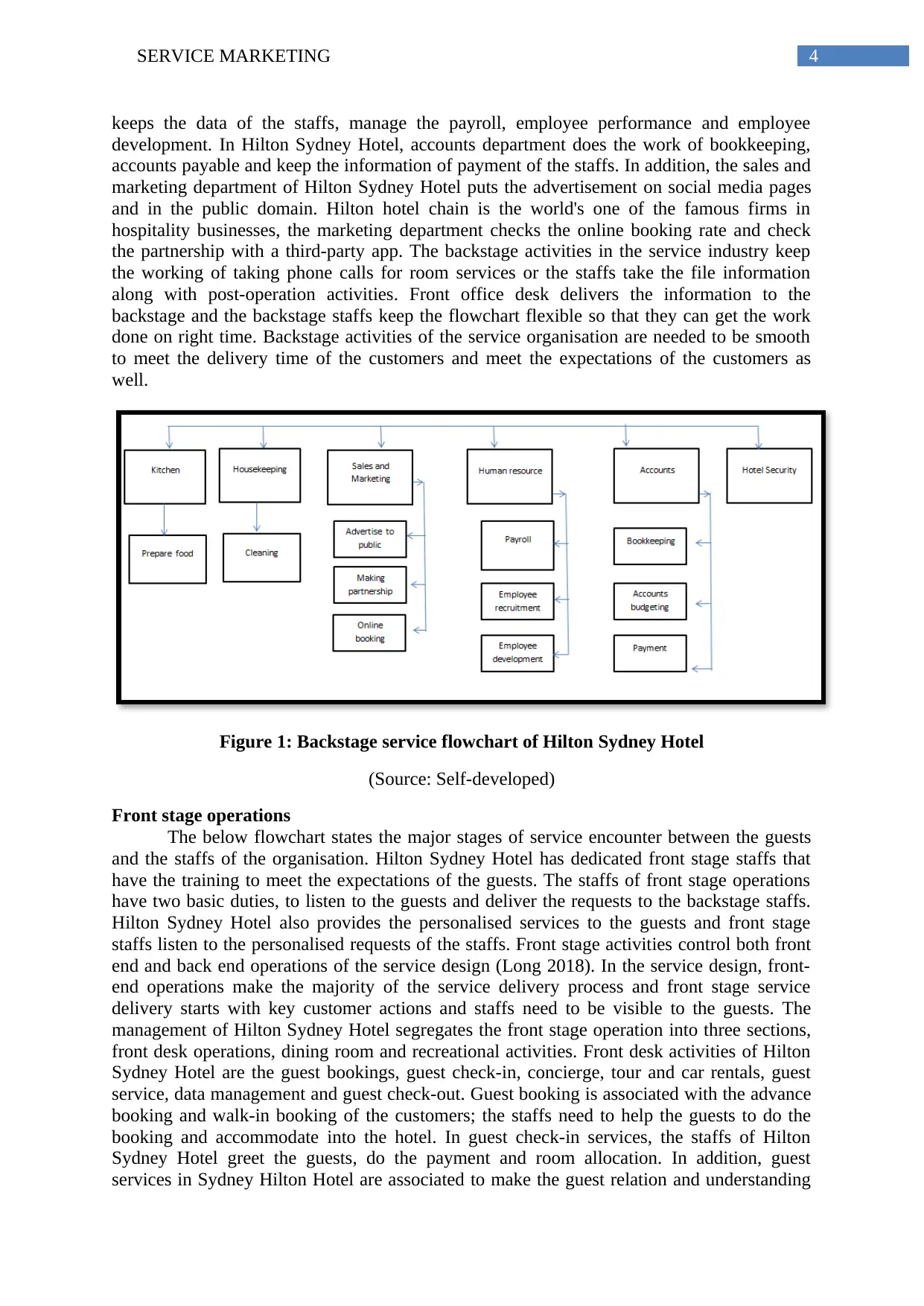
4SERVICE MARKETING
keeps the data of the staffs, manage the payroll, employee performance and employee
development. In Hilton Sydney Hotel, accounts department does the work of bookkeeping,
accounts payable and keep the information of payment of the staffs. In addition, the sales and
marketing department of Hilton Sydney Hotel puts the advertisement on social media pages
and in the public domain. Hilton hotel chain is the world's one of the famous firms in
hospitality businesses, the marketing department checks the online booking rate and check
the partnership with a third-party app. The backstage activities in the service industry keep
the working of taking phone calls for room services or the staffs take the file information
along with post-operation activities. Front office desk delivers the information to the
backstage and the backstage staffs keep the flowchart flexible so that they can get the work
done on right time. Backstage activities of the service organisation are needed to be smooth
to meet the delivery time of the customers and meet the expectations of the customers as
well.
Figure 1: Backstage service flowchart of Hilton Sydney Hotel
(Source: Self-developed)
Front stage operations
The below flowchart states the major stages of service encounter between the guests
and the staffs of the organisation. Hilton Sydney Hotel has dedicated front stage staffs that
have the training to meet the expectations of the guests. The staffs of front stage operations
have two basic duties, to listen to the guests and deliver the requests to the backstage staffs.
Hilton Sydney Hotel also provides the personalised services to the guests and front stage
staffs listen to the personalised requests of the staffs. Front stage activities control both front
end and back end operations of the service design (Long 2018). In the service design, front-
end operations make the majority of the service delivery process and front stage service
delivery starts with key customer actions and staffs need to be visible to the guests. The
management of Hilton Sydney Hotel segregates the front stage operation into three sections,
front desk operations, dining room and recreational activities. Front desk activities of Hilton
Sydney Hotel are the guest bookings, guest check-in, concierge, tour and car rentals, guest
service, data management and guest check-out. Guest booking is associated with the advance
booking and walk-in booking of the customers; the staffs need to help the guests to do the
booking and accommodate into the hotel. In guest check-in services, the staffs of Hilton
Sydney Hotel greet the guests, do the payment and room allocation. In addition, guest
services in Sydney Hilton Hotel are associated to make the guest relation and understanding
keeps the data of the staffs, manage the payroll, employee performance and employee
development. In Hilton Sydney Hotel, accounts department does the work of bookkeeping,
accounts payable and keep the information of payment of the staffs. In addition, the sales and
marketing department of Hilton Sydney Hotel puts the advertisement on social media pages
and in the public domain. Hilton hotel chain is the world's one of the famous firms in
hospitality businesses, the marketing department checks the online booking rate and check
the partnership with a third-party app. The backstage activities in the service industry keep
the working of taking phone calls for room services or the staffs take the file information
along with post-operation activities. Front office desk delivers the information to the
backstage and the backstage staffs keep the flowchart flexible so that they can get the work
done on right time. Backstage activities of the service organisation are needed to be smooth
to meet the delivery time of the customers and meet the expectations of the customers as
well.
Figure 1: Backstage service flowchart of Hilton Sydney Hotel
(Source: Self-developed)
Front stage operations
The below flowchart states the major stages of service encounter between the guests
and the staffs of the organisation. Hilton Sydney Hotel has dedicated front stage staffs that
have the training to meet the expectations of the guests. The staffs of front stage operations
have two basic duties, to listen to the guests and deliver the requests to the backstage staffs.
Hilton Sydney Hotel also provides the personalised services to the guests and front stage
staffs listen to the personalised requests of the staffs. Front stage activities control both front
end and back end operations of the service design (Long 2018). In the service design, front-
end operations make the majority of the service delivery process and front stage service
delivery starts with key customer actions and staffs need to be visible to the guests. The
management of Hilton Sydney Hotel segregates the front stage operation into three sections,
front desk operations, dining room and recreational activities. Front desk activities of Hilton
Sydney Hotel are the guest bookings, guest check-in, concierge, tour and car rentals, guest
service, data management and guest check-out. Guest booking is associated with the advance
booking and walk-in booking of the customers; the staffs need to help the guests to do the
booking and accommodate into the hotel. In guest check-in services, the staffs of Hilton
Sydney Hotel greet the guests, do the payment and room allocation. In addition, guest
services in Sydney Hilton Hotel are associated to make the guest relation and understanding
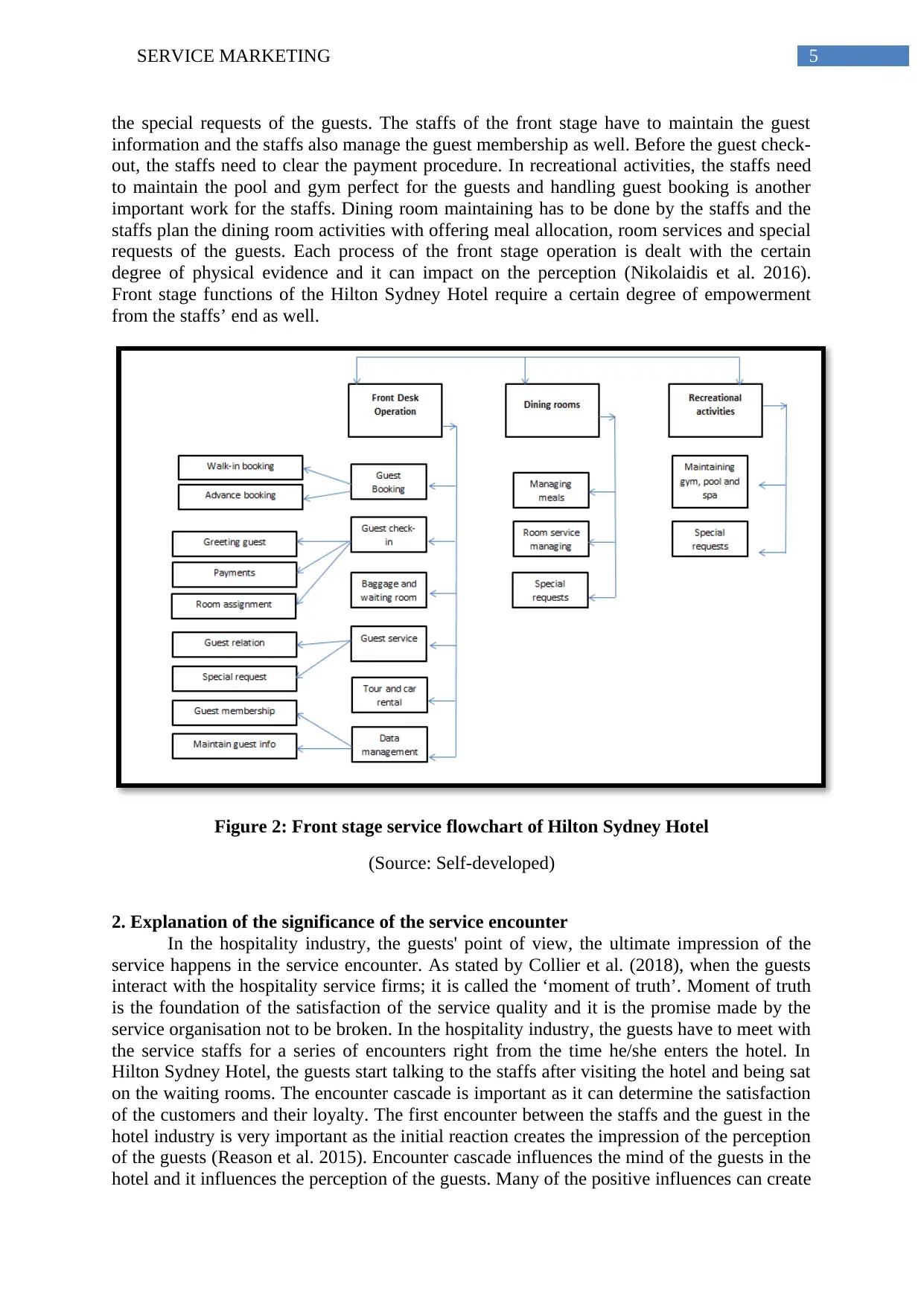
5SERVICE MARKETING
the special requests of the guests. The staffs of the front stage have to maintain the guest
information and the staffs also manage the guest membership as well. Before the guest check-
out, the staffs need to clear the payment procedure. In recreational activities, the staffs need
to maintain the pool and gym perfect for the guests and handling guest booking is another
important work for the staffs. Dining room maintaining has to be done by the staffs and the
staffs plan the dining room activities with offering meal allocation, room services and special
requests of the guests. Each process of the front stage operation is dealt with the certain
degree of physical evidence and it can impact on the perception (Nikolaidis et al. 2016).
Front stage functions of the Hilton Sydney Hotel require a certain degree of empowerment
from the staffs’ end as well.
Figure 2: Front stage service flowchart of Hilton Sydney Hotel
(Source: Self-developed)
2. Explanation of the significance of the service encounter
In the hospitality industry, the guests' point of view, the ultimate impression of the
service happens in the service encounter. As stated by Collier et al. (2018), when the guests
interact with the hospitality service firms; it is called the ‘moment of truth’. Moment of truth
is the foundation of the satisfaction of the service quality and it is the promise made by the
service organisation not to be broken. In the hospitality industry, the guests have to meet with
the service staffs for a series of encounters right from the time he/she enters the hotel. In
Hilton Sydney Hotel, the guests start talking to the staffs after visiting the hotel and being sat
on the waiting rooms. The encounter cascade is important as it can determine the satisfaction
of the customers and their loyalty. The first encounter between the staffs and the guest in the
hotel industry is very important as the initial reaction creates the impression of the perception
of the guests (Reason et al. 2015). Encounter cascade influences the mind of the guests in the
hotel and it influences the perception of the guests. Many of the positive influences can create
the special requests of the guests. The staffs of the front stage have to maintain the guest
information and the staffs also manage the guest membership as well. Before the guest check-
out, the staffs need to clear the payment procedure. In recreational activities, the staffs need
to maintain the pool and gym perfect for the guests and handling guest booking is another
important work for the staffs. Dining room maintaining has to be done by the staffs and the
staffs plan the dining room activities with offering meal allocation, room services and special
requests of the guests. Each process of the front stage operation is dealt with the certain
degree of physical evidence and it can impact on the perception (Nikolaidis et al. 2016).
Front stage functions of the Hilton Sydney Hotel require a certain degree of empowerment
from the staffs’ end as well.
Figure 2: Front stage service flowchart of Hilton Sydney Hotel
(Source: Self-developed)
2. Explanation of the significance of the service encounter
In the hospitality industry, the guests' point of view, the ultimate impression of the
service happens in the service encounter. As stated by Collier et al. (2018), when the guests
interact with the hospitality service firms; it is called the ‘moment of truth’. Moment of truth
is the foundation of the satisfaction of the service quality and it is the promise made by the
service organisation not to be broken. In the hospitality industry, the guests have to meet with
the service staffs for a series of encounters right from the time he/she enters the hotel. In
Hilton Sydney Hotel, the guests start talking to the staffs after visiting the hotel and being sat
on the waiting rooms. The encounter cascade is important as it can determine the satisfaction
of the customers and their loyalty. The first encounter between the staffs and the guest in the
hotel industry is very important as the initial reaction creates the impression of the perception
of the guests (Reason et al. 2015). Encounter cascade influences the mind of the guests in the
hotel and it influences the perception of the guests. Many of the positive influences can create
⊘ This is a preview!⊘
Do you want full access?
Subscribe today to unlock all pages.

Trusted by 1+ million students worldwide
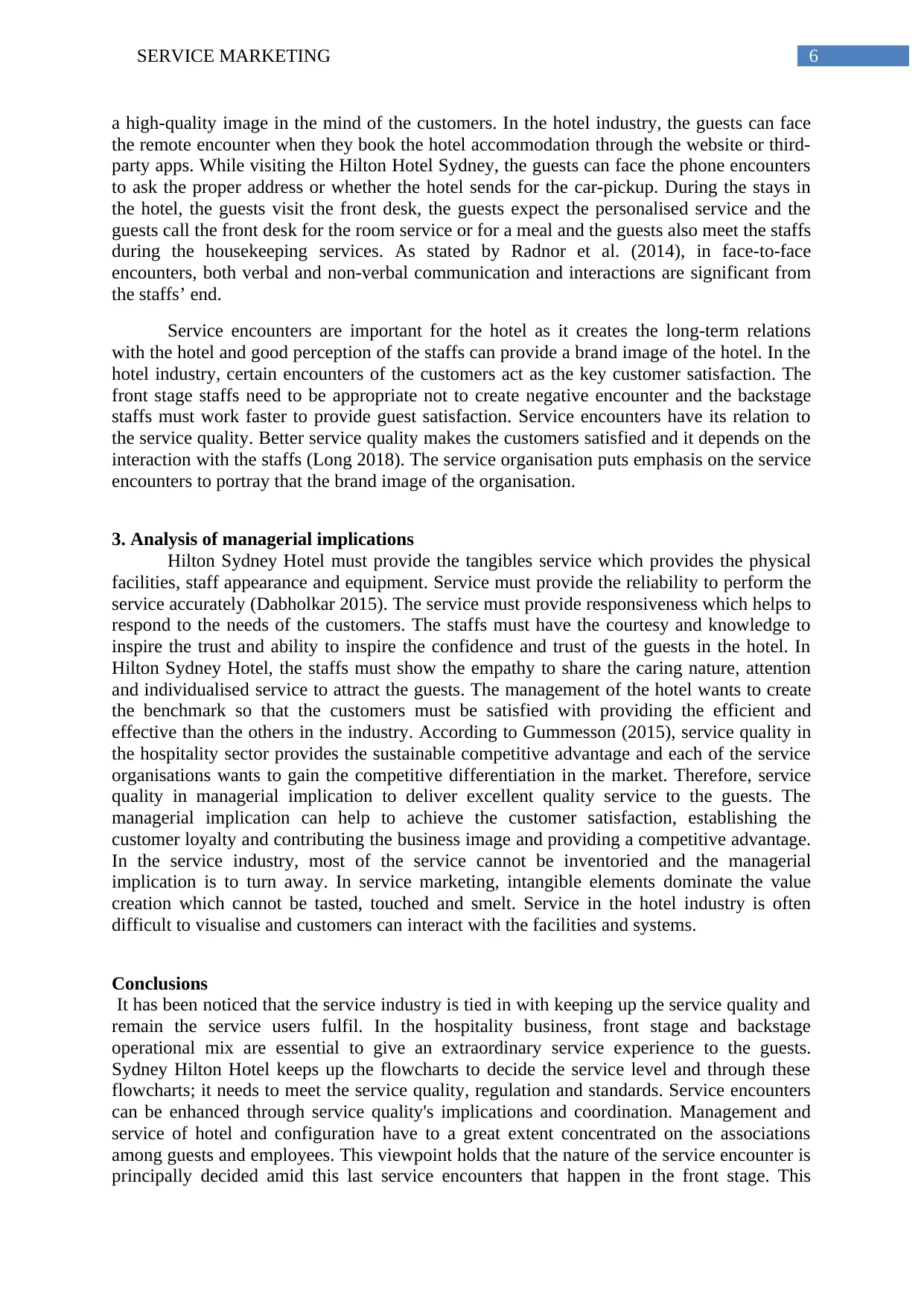
6SERVICE MARKETING
a high-quality image in the mind of the customers. In the hotel industry, the guests can face
the remote encounter when they book the hotel accommodation through the website or third-
party apps. While visiting the Hilton Hotel Sydney, the guests can face the phone encounters
to ask the proper address or whether the hotel sends for the car-pickup. During the stays in
the hotel, the guests visit the front desk, the guests expect the personalised service and the
guests call the front desk for the room service or for a meal and the guests also meet the staffs
during the housekeeping services. As stated by Radnor et al. (2014), in face-to-face
encounters, both verbal and non-verbal communication and interactions are significant from
the staffs’ end.
Service encounters are important for the hotel as it creates the long-term relations
with the hotel and good perception of the staffs can provide a brand image of the hotel. In the
hotel industry, certain encounters of the customers act as the key customer satisfaction. The
front stage staffs need to be appropriate not to create negative encounter and the backstage
staffs must work faster to provide guest satisfaction. Service encounters have its relation to
the service quality. Better service quality makes the customers satisfied and it depends on the
interaction with the staffs (Long 2018). The service organisation puts emphasis on the service
encounters to portray that the brand image of the organisation.
3. Analysis of managerial implications
Hilton Sydney Hotel must provide the tangibles service which provides the physical
facilities, staff appearance and equipment. Service must provide the reliability to perform the
service accurately (Dabholkar 2015). The service must provide responsiveness which helps to
respond to the needs of the customers. The staffs must have the courtesy and knowledge to
inspire the trust and ability to inspire the confidence and trust of the guests in the hotel. In
Hilton Sydney Hotel, the staffs must show the empathy to share the caring nature, attention
and individualised service to attract the guests. The management of the hotel wants to create
the benchmark so that the customers must be satisfied with providing the efficient and
effective than the others in the industry. According to Gummesson (2015), service quality in
the hospitality sector provides the sustainable competitive advantage and each of the service
organisations wants to gain the competitive differentiation in the market. Therefore, service
quality in managerial implication to deliver excellent quality service to the guests. The
managerial implication can help to achieve the customer satisfaction, establishing the
customer loyalty and contributing the business image and providing a competitive advantage.
In the service industry, most of the service cannot be inventoried and the managerial
implication is to turn away. In service marketing, intangible elements dominate the value
creation which cannot be tasted, touched and smelt. Service in the hotel industry is often
difficult to visualise and customers can interact with the facilities and systems.
Conclusions
It has been noticed that the service industry is tied in with keeping up the service quality and
remain the service users fulfil. In the hospitality business, front stage and backstage
operational mix are essential to give an extraordinary service experience to the guests.
Sydney Hilton Hotel keeps up the flowcharts to decide the service level and through these
flowcharts; it needs to meet the service quality, regulation and standards. Service encounters
can be enhanced through service quality's implications and coordination. Management and
service of hotel and configuration have to a great extent concentrated on the associations
among guests and employees. This viewpoint holds that the nature of the service encounter is
principally decided amid this last service encounters that happen in the front stage. This
a high-quality image in the mind of the customers. In the hotel industry, the guests can face
the remote encounter when they book the hotel accommodation through the website or third-
party apps. While visiting the Hilton Hotel Sydney, the guests can face the phone encounters
to ask the proper address or whether the hotel sends for the car-pickup. During the stays in
the hotel, the guests visit the front desk, the guests expect the personalised service and the
guests call the front desk for the room service or for a meal and the guests also meet the staffs
during the housekeeping services. As stated by Radnor et al. (2014), in face-to-face
encounters, both verbal and non-verbal communication and interactions are significant from
the staffs’ end.
Service encounters are important for the hotel as it creates the long-term relations
with the hotel and good perception of the staffs can provide a brand image of the hotel. In the
hotel industry, certain encounters of the customers act as the key customer satisfaction. The
front stage staffs need to be appropriate not to create negative encounter and the backstage
staffs must work faster to provide guest satisfaction. Service encounters have its relation to
the service quality. Better service quality makes the customers satisfied and it depends on the
interaction with the staffs (Long 2018). The service organisation puts emphasis on the service
encounters to portray that the brand image of the organisation.
3. Analysis of managerial implications
Hilton Sydney Hotel must provide the tangibles service which provides the physical
facilities, staff appearance and equipment. Service must provide the reliability to perform the
service accurately (Dabholkar 2015). The service must provide responsiveness which helps to
respond to the needs of the customers. The staffs must have the courtesy and knowledge to
inspire the trust and ability to inspire the confidence and trust of the guests in the hotel. In
Hilton Sydney Hotel, the staffs must show the empathy to share the caring nature, attention
and individualised service to attract the guests. The management of the hotel wants to create
the benchmark so that the customers must be satisfied with providing the efficient and
effective than the others in the industry. According to Gummesson (2015), service quality in
the hospitality sector provides the sustainable competitive advantage and each of the service
organisations wants to gain the competitive differentiation in the market. Therefore, service
quality in managerial implication to deliver excellent quality service to the guests. The
managerial implication can help to achieve the customer satisfaction, establishing the
customer loyalty and contributing the business image and providing a competitive advantage.
In the service industry, most of the service cannot be inventoried and the managerial
implication is to turn away. In service marketing, intangible elements dominate the value
creation which cannot be tasted, touched and smelt. Service in the hotel industry is often
difficult to visualise and customers can interact with the facilities and systems.
Conclusions
It has been noticed that the service industry is tied in with keeping up the service quality and
remain the service users fulfil. In the hospitality business, front stage and backstage
operational mix are essential to give an extraordinary service experience to the guests.
Sydney Hilton Hotel keeps up the flowcharts to decide the service level and through these
flowcharts; it needs to meet the service quality, regulation and standards. Service encounters
can be enhanced through service quality's implications and coordination. Management and
service of hotel and configuration have to a great extent concentrated on the associations
among guests and employees. This viewpoint holds that the nature of the service encounter is
principally decided amid this last service encounters that happen in the front stage. This
Paraphrase This Document
Need a fresh take? Get an instant paraphrase of this document with our AI Paraphraser
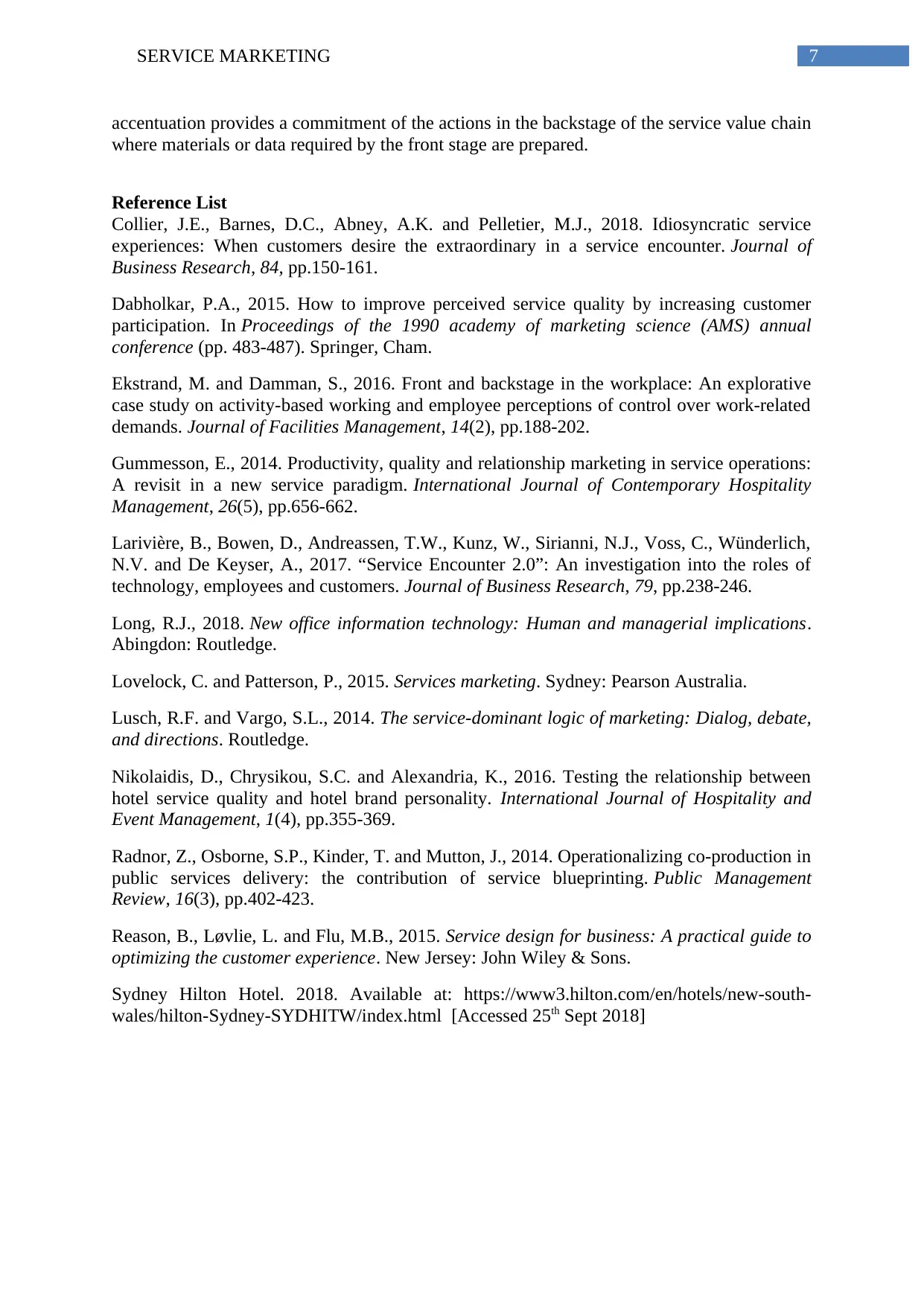
7SERVICE MARKETING
accentuation provides a commitment of the actions in the backstage of the service value chain
where materials or data required by the front stage are prepared.
Reference List
Collier, J.E., Barnes, D.C., Abney, A.K. and Pelletier, M.J., 2018. Idiosyncratic service
experiences: When customers desire the extraordinary in a service encounter. Journal of
Business Research, 84, pp.150-161.
Dabholkar, P.A., 2015. How to improve perceived service quality by increasing customer
participation. In Proceedings of the 1990 academy of marketing science (AMS) annual
conference (pp. 483-487). Springer, Cham.
Ekstrand, M. and Damman, S., 2016. Front and backstage in the workplace: An explorative
case study on activity-based working and employee perceptions of control over work-related
demands. Journal of Facilities Management, 14(2), pp.188-202.
Gummesson, E., 2014. Productivity, quality and relationship marketing in service operations:
A revisit in a new service paradigm. International Journal of Contemporary Hospitality
Management, 26(5), pp.656-662.
Larivière, B., Bowen, D., Andreassen, T.W., Kunz, W., Sirianni, N.J., Voss, C., Wünderlich,
N.V. and De Keyser, A., 2017. “Service Encounter 2.0”: An investigation into the roles of
technology, employees and customers. Journal of Business Research, 79, pp.238-246.
Long, R.J., 2018. New office information technology: Human and managerial implications.
Abingdon: Routledge.
Lovelock, C. and Patterson, P., 2015. Services marketing. Sydney: Pearson Australia.
Lusch, R.F. and Vargo, S.L., 2014. The service-dominant logic of marketing: Dialog, debate,
and directions. Routledge.
Nikolaidis, D., Chrysikou, S.C. and Alexandria, K., 2016. Testing the relationship between
hotel service quality and hotel brand personality. International Journal of Hospitality and
Event Management, 1(4), pp.355-369.
Radnor, Z., Osborne, S.P., Kinder, T. and Mutton, J., 2014. Operationalizing co-production in
public services delivery: the contribution of service blueprinting. Public Management
Review, 16(3), pp.402-423.
Reason, B., Løvlie, L. and Flu, M.B., 2015. Service design for business: A practical guide to
optimizing the customer experience. New Jersey: John Wiley & Sons.
Sydney Hilton Hotel. 2018. Available at: https://www3.hilton.com/en/hotels/new-south-
wales/hilton-Sydney-SYDHITW/index.html [Accessed 25th Sept 2018]
accentuation provides a commitment of the actions in the backstage of the service value chain
where materials or data required by the front stage are prepared.
Reference List
Collier, J.E., Barnes, D.C., Abney, A.K. and Pelletier, M.J., 2018. Idiosyncratic service
experiences: When customers desire the extraordinary in a service encounter. Journal of
Business Research, 84, pp.150-161.
Dabholkar, P.A., 2015. How to improve perceived service quality by increasing customer
participation. In Proceedings of the 1990 academy of marketing science (AMS) annual
conference (pp. 483-487). Springer, Cham.
Ekstrand, M. and Damman, S., 2016. Front and backstage in the workplace: An explorative
case study on activity-based working and employee perceptions of control over work-related
demands. Journal of Facilities Management, 14(2), pp.188-202.
Gummesson, E., 2014. Productivity, quality and relationship marketing in service operations:
A revisit in a new service paradigm. International Journal of Contemporary Hospitality
Management, 26(5), pp.656-662.
Larivière, B., Bowen, D., Andreassen, T.W., Kunz, W., Sirianni, N.J., Voss, C., Wünderlich,
N.V. and De Keyser, A., 2017. “Service Encounter 2.0”: An investigation into the roles of
technology, employees and customers. Journal of Business Research, 79, pp.238-246.
Long, R.J., 2018. New office information technology: Human and managerial implications.
Abingdon: Routledge.
Lovelock, C. and Patterson, P., 2015. Services marketing. Sydney: Pearson Australia.
Lusch, R.F. and Vargo, S.L., 2014. The service-dominant logic of marketing: Dialog, debate,
and directions. Routledge.
Nikolaidis, D., Chrysikou, S.C. and Alexandria, K., 2016. Testing the relationship between
hotel service quality and hotel brand personality. International Journal of Hospitality and
Event Management, 1(4), pp.355-369.
Radnor, Z., Osborne, S.P., Kinder, T. and Mutton, J., 2014. Operationalizing co-production in
public services delivery: the contribution of service blueprinting. Public Management
Review, 16(3), pp.402-423.
Reason, B., Løvlie, L. and Flu, M.B., 2015. Service design for business: A practical guide to
optimizing the customer experience. New Jersey: John Wiley & Sons.
Sydney Hilton Hotel. 2018. Available at: https://www3.hilton.com/en/hotels/new-south-
wales/hilton-Sydney-SYDHITW/index.html [Accessed 25th Sept 2018]
1 out of 8
Related Documents
Your All-in-One AI-Powered Toolkit for Academic Success.
+13062052269
info@desklib.com
Available 24*7 on WhatsApp / Email
![[object Object]](/_next/static/media/star-bottom.7253800d.svg)
Unlock your academic potential
Copyright © 2020–2026 A2Z Services. All Rights Reserved. Developed and managed by ZUCOL.





